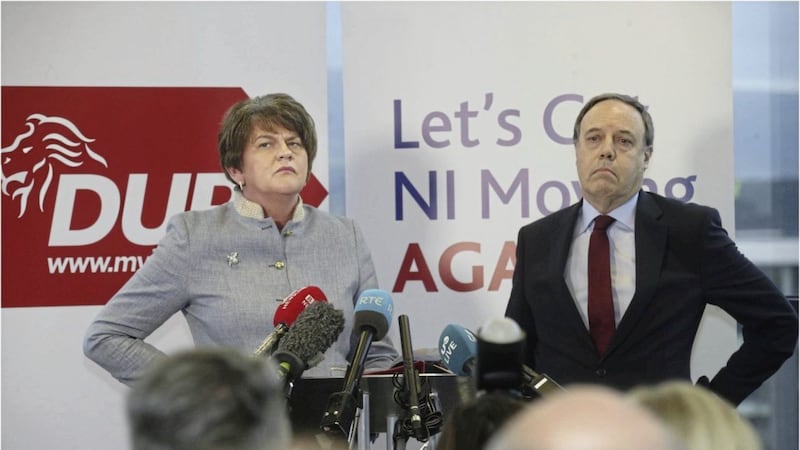The DUP launched its Westminster election campaign last week with no mention of Brexit, focusing instead on the restoration of Stormont.
This week the party has produced a ''12-point plan to get Northern Ireland moving again'' that contains an almost equally glaring omission.
Nowhere in the plan, every point of which demands or requires Stormont’s return, is there mention of Irish language legislation - the price of Stormont’s return.
It might seem too much to expect the DUP to head into an election highlighting something deeply unpopular with the unionist electorate and opposed by the UUP.
However, politics has reached a point of frustration where it must be asked when the DUP ever will start preparing its base for a climb-down on this issue.
After the last assembly election in March 2017, when the DUP did badly and another election seemed likely within months, leader Arlene Foster began promoting the idea of parallel or combined legislation with Ulster-Scots. That was good enough for the DUP and Sinn Féin to reach a draft deal in February 2018 but when the DUP’s base took fright the party pulled the plug. No better idea or salesmanship of the same idea has followed.
At the DUP’s annual conference last month, Foster did say her party is committed to “legislate in a balanced way for the Irish language”. She also expressed respect for Irish speakers and said the language should not be incompatible with unionism.
A lot of this has been heard before and could be dismissed as platitudinous. That is all the more reason to ask why it should be considered unmentionable in election literature less than four weeks later.
Something is definitely in the air regarding a return to Stormont. Last weekend’s Sinn Féin conference sent a number of obvious signals that republicans would like a deal soon. With support for both parties dropping and a lengthy Brexit transition period about to begin, there is no point sitting on the sidelines for much longer.
But if Stormont developments do move quickly after next month’s election, the DUP will be caught once again with an unprepared base.
Foster ought to drop the platitudes on Irish, which few believe, and engage in some English plain speaking. She should explain the draft legislation agreed with Sinn Féin in 2018 addressed every valid concern. There were to be no discriminatory job quotas, no criminal offence of non-cooperation, no coercion by commissioners, no imposition of multilingual signage in residential areas or any of the demands by Sinn Féin and some Irish language campaigners that had raised unionist fears.
The whole thing amounted to little more than promising translations of government bumpf on request. The DUP leadership team that negotiated this deal was delighted with it, yet nearly two years after getting cold feet at the initial grassroots response the party is still unable to say it is a small price to pay to restore devolution.
As the DUP is now campaigning rather desperately to restore devolution, logically it should be highlighting the bargain of its Irish language deal rather than sticking it back down the memory hole until the polls have closed.
Point 11 of the DUP’s plan calls for ''far-reaching assembly reform'', echoing key statements from the platform at the Sinn Féin conference.
However, one thing both parties have consistently agreed since 2015 Fresh Start in 2015 is that they want to keep their assembly vetoes. There is no prospect of them reforming the petition of concern in any meaningful way, enabling contentious issues to pass by a simple majority vote - the face-saving solution proposed by same-sex marriage campaigners, for example. When both parties alluded in 2018 to passing same-sex marriage by a private members bill, it was by mutual understanding.
A similar understanding is still envisaged for an Irish language act.
Sinn Féin and the DUP foresee the route back to Stormont as another classic stitch-up, including language legislation agreed in advance between themselves, to be sprung on a public they have wound up with years of grandstanding, who will be told to welcome the deal as the sudden solution to everyone’s demands.
There is no reason to believe this will go any better than it did in 2018.









